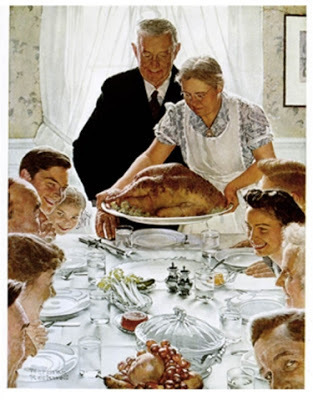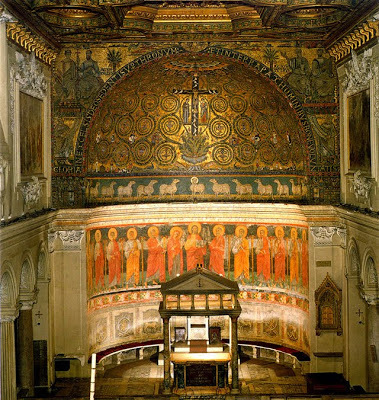Dwight Longenecker's Blog, page 320
November 25, 2011
Praying Awake
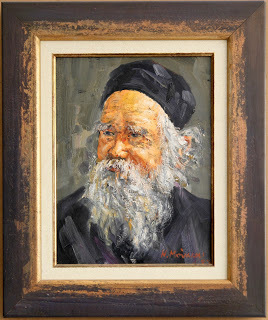
Novice: Why do I fall asleep during prayer?
Old Monk: Because you haven't yet learned that prayer is the way to become truly awake.[image error]
Published on November 25, 2011 06:39
Black Friday and Good Friday
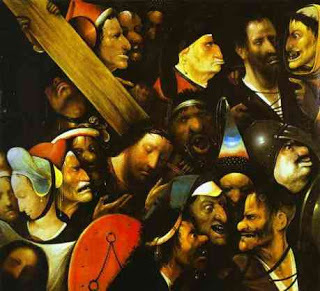
Has anybody else glimpsed the irony? Black Friday everybody gets up early and goes to pay homage to the great American idol-- Mammon. Yet we call it 'Black Friday'. Do we call it Black Friday because all the businesses go for a few days into the black rather than running on credit? I dunno and don't much care. The irony is that people go running out to buy their gadgets and trinkets (and they go in great crowds) which they think will make them happy and it's called Black Friday.
Jump forward a few months and we remember the worst thing that ever happened--that mankind killed the Son of God who loved them--and we call this Friday 'Good'. The irony continues because in our society more and more people neglect Good Friday and worship on Black Friday. In fact, the reason they neglect Good Friday is because they worshipped another god on Black Friday. You cannot serve both the Son of Man and Mammon.
So welcome to the great Christian country America--where on Black Friday the Christians--like everybody else--spend hundreds of dollars for goodies while they give Jesus--Good Friday.
[image error]
Published on November 25, 2011 06:24
November 24, 2011
Happy Thanksgiving
Published on November 24, 2011 05:43
November 23, 2011
Chust for Nice
Published on November 23, 2011 13:17
Long or Short Prayers?
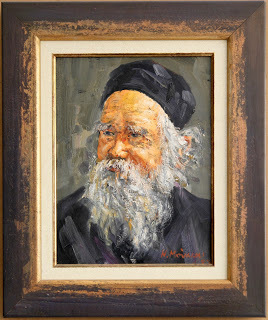
Novice: How long do you pray?
Old Monk: Two minutes. But it takes me twenty minutes to get there.[image error]
Published on November 23, 2011 09:36
Clement of Rome
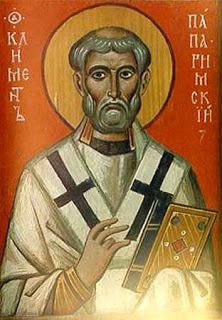
Learn about Clement of Rome who believed in apostolic succession and wrote: "Our apostles also knew, through our Lord Jesus Christ, that there would be strife on account of the office of the episcopate. For this reason, therefore, inasmuch as they had obtained a perfect fore-knowledge of this, they appointed those [ministers] already mentioned, and afterwards gave instructions, that when these should fall asleep, other approved men should succeed them in their ministry."[image error]
Published on November 23, 2011 08:46
All or Many? The Real Problem

Over at the National Catholic Reporter there is a satirical piece about the new Mass translation. The piece itself is sort of funny, and as one who writes 'leaden satire' on this blog I can appreciate it well enough.
What tickles me most though, are the comments--especially ones from priests. Here's one: he's having a big grumble and stamping his foot and saying he's not going to use the new missal...Most of all, he says, "And I for one will not pray heresy..... Christ came for "all" not just "many".
Is it possible that this Catholic priest does not know that this is a direct quotation from Matthew's gospel? "Then he took a cup, gave thanks, and gave it to them, saying, "Drink from it, all of you, for this is my blood of the covenant, which will be shed on behalf of many for the forgiveness of sins." Apparently not.
I've heard other priests complain about this faithfulness to the actual words of Our Lord. One of them said with a pained expression, "It grieves me when I read those words knowing how so many of our people will feel excluded." Whaat? If you're at Mass you're not one of those who are excluded--if you're in a state of grace that is. So who's excluded? The people who are not at Mass--and they excluded themselves, and geesh---they're not even there so how are they going to be hurt and excluded?
But anyhow, the word 'many' in the canon is balanced by the words the priest says at the introduction to communion, "Behold the Lamb of God. Behold him who takes away the sins of the world." Beautiful. It is there at the introduction to communion that the priest declares to the world with John the Baptist--that Christ takes away the sins of the whole world." Then he welcomes all who will come to him with the words, "Blessed are those who are called to the supper of the Lamb."
The two phrases in the liturgy--both of them direct quotations from the gospels--balance each other and reveal the true Catholic theology: It ain't that hard: Christ died for the sins of the whole world, everybody is welcome to accept the gift, but not everyone will.
To go off on a tangent a little, we also have to understand the context of Jesus saying at the Last Supper. When he says 'shed for many for the forgiveness of sins' the emphasis is actually on his inclusiveness, not his exclusiveness. He is looking to 'those other sheep' of the Gentiles, and his word 'many' therefore means, "Many, many more than are here present who you apostles cannot imagine right now." This is an opening up, not a narrowing down.
In any case, this is not the real problem. The quarrel over the words is just a symptom of the real problem. The real problem is that the modern Catholic Church is shot through with the heresy of universalism and semi-universalism.
What is universalism? The belief that "everyone will eventually be saved no matter what." Semi-universalism is "we hope and believe that everyone will be saved no matter what." In other words, semi- universalism is universalism for those who don't have the guts to be universalists.
Universalism is a heresy because it is a half truth. Christ did die for all, but the universalist only holds on to that part of the truth. He denies the other half of the full truth, that not everyone will accept that grace and therefore some will go to hell.
It is a sentimentalist heresy because it is based not on clear thinking or logic or the authority of Church teaching or the catechism or the Sacred Scriptures, for there is no support anywhere for universalism in the Catholic faith. Instead it is based on people's longing to be nice and 'not hurt anyone's feelings' and the syrupy sentiment that, "God is too loving to send anyone to hell."
The effects of universalism on the church are catastrophic. It's not real hard to understand. People aren't dumb. If everyone is going to be saved, then why bother to go to church? If everyone is going to be saved there is no such thing as mortal sin. If everyone is going to be saved there is no need for evangelism. If everyone is going to be saved there is no need to feed the hungry, become a priest, build the church and become a saint.
Of all the various Hydra heads of modernism, universalism is probably the most insidious and diabolical and destructive of them all. It is a wolf in sheep's clothing. It's sweetness and light and sentimentality and underneath it's poison.[image error]
Published on November 23, 2011 08:05
The Theology of Thanksgiving
Here is my latest article for Crisis website. It explores the Judeao Christian background to the Thanksgiving meal.[image error]
Published on November 23, 2011 05:23
November 22, 2011
Understanding Cecilia
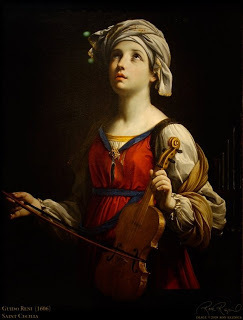
"Scripture can only be interpreted in the lives of the saints." So says Pope Benedict XVI, and it has caused me to ponder on the three levels on which we can understand the saints, and these three levels are well illustrated by St Cecilia today.
The first level is the historical. We know of Cecilia as a virgin martyr of the early Roman period, that she died at the hands of torturers during the reign of Marcus Aurelius. Because she sang hymns as she went to her death she is the patron of musicians. So we have the facts of her saintly life and heroic death, and these facts alone are an inspiration.
However, a second level on which to understand the saints is the Scriptural. The gospel read for today is that of the wise and foolish virgins. So this virgin martyr lives out the gospel. We interpret the gospel through her life and the lives of other virgin saints. As we ponder her life we see what it means to keep the lamps lit through the oil of divine grace and the fire of the Holy Spirit. In her martyrdom we see what it means to go out joyfully to meet the bridegroom, for the bridegroom is Christ who is coming for his bride. We therefore understand the gospel. It means waiting and watching for Christ and joyfully giving all for his love.
There is a third level of understanding the saints which might be called 'symbolical' or 'universal'. At this level the life and death of the saint connects with something greater and deeper. It connects with universal principles and symbols from the unconscious. So, Cecilia becomes a living symbol of virginity and martyrdom. As such she shows us not just what it means to be pure. She shows us purity. She shows us courage. She shows us innocence and wisdom. She shows us the child like virtues of trust. She abides. She endures. The virgin martyrs connect us with the deep stories of childhood--here are all the young heroines of the stories--Belle who won over the Beast, Humble Cinderella who won the heart of the bridegroom--Beatrice who rose beautiful and represented eternal beauty before young Dante.
The lives of the saints therefore transcend the natural understanding. They are more than inspiring examples or courageous role models or even admirable martyrs for a cause. They are perfected by God's grace and eternal in the heavens.
Published on November 22, 2011 08:22
Twitter is micro blogging. In addition to this blog I tweet pithy comments, insights on spirituality and interesting links. Follow me on Twitter by clicking on the icon on the right sidebar.
Published on November 22, 2011 07:01
Dwight Longenecker's Blog
- Dwight Longenecker's profile
- 80 followers
Dwight Longenecker isn't a Goodreads Author
(yet),
but they
do have a blog,
so here are some recent posts imported from
their feed.


